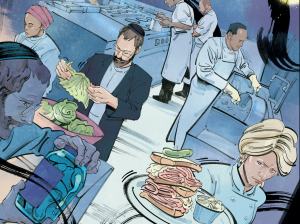What happened in the past 12 months? Rather a lot! So to pare it down, I’m limiting this end-of-year recap to things that kept popping up on my own finite radar, with an emphasis on those with relevance to Jewish Canadians. I will not ask whether I missed anything; assume that I have missed—or skipped over—a ton. These are just a handful of the stories about our society I see as relevant going into 2025 and beyond.
Campus protest culture camps out
The encampment trend that took hold at Columbia University and wound up all over the place—including at numerous Canadian schools—became the big story of 2024 for Jewish media and points beyond, the bold, in-your-face sign that the next generation of cultural elites had made Palestine their cause. Or a sign of something else? Not all the student protesters were students; some were professors, others unaffiliated. And the students not on board with the goings-on were very possibly more likely to demonstrate this by going to class than by organizing a counter-demonstration, although the Jewish professor currently banned by Columbia showed up at the University of Toronto.
Columbia University temporarily banned Jewish Israeli professor-turned-activist Shai Davidai from campus.
— Caryma Sa'd – Lawyer + Political Satirist (@CarymaRules) October 22, 2024
Here, he speaks at the University of Toronto rally about antisemitism in academia and beyond.
His presence was denounced by local pro-Palestine groups.#cdnpoli #Toronto… pic.twitter.com/GjwoyWgsf9
Literary world is purging ‘Zionists’
First, a small magazine called Guernica had a meltdown when an Israeli writer, Joanna Chen, wrote an arguably pro-Palestinian essay, but did so while being, you know, Israeli. Chen had refused to serve in the IDF, but she was still too Zionistic for the pages in question. Next up, author Joshua Leifer tried to do a book event for his Tablets Shattered, but a Brooklyn bookstore employee cancelled it just as it was about to start.
Less than an hour before the launch event for my book Tablets Shattered, a conversation with Rabbi Andy Bachman, @powerHouseBooks in Brooklyn told me they were unwilling to host the conversation with Andy because they would not permit a Zionist on the premises.
— Joshua Ort-Leifer (@joshualeifer) August 21, 2024
Why was this critical-of-Israel book a problem? The interlocutor was going to be a liberal Zionist and one can’t be having that. The books-and-essays world, once a place where Jewish authors once felt reasonably comfortable in North America, now had spreadsheets identifying authors based on indicators of their relationship to Israel.
Searching for signals of antizionism
Look, Diaspora Jews have gone off Israel! No, wait, they’re all-in on Israel, and that’s why they’re buying guns and going to vote for Donald Trump! But then we learned that Jewish Canadians—like our American counterparts—arevirtually unanimous in the belief that Israel should exist as a Jewish state.
79% of jews voted for Kamala Harris.
— Stew Peters (@realstewpeters) November 6, 2024
Trump received the lowest proportion of jewish votes in 24 years.
Why cater to people that HATE you? pic.twitter.com/pI4nykVI1q
(And in similarly shouldn’t-be-surprising news, American Jewish voters overwhelmingly preferred a candidate who wasn’t Donald Trump.)
‘Tradwives’ are totally taking over
Her picture-perfect life as a Mormon farm wife has made Hannah Neeleman, the woman behind "Ballerina Farm," a social media star and a lightning rod for every kind of opinion about how women should live. https://t.co/dpnzZa8KaU
— The New York Times (@nytimes) December 3, 2024
The concept went from a niche online subculture to mainstream news and just incessant critical coverage. Tradwife this, tradwife that, all to the bafflement of actual traditionalist brides, Jewish and otherwise, if they were even online enough to notice, that is. A tradwife, for the uninitiated, is a social media influencer who posts content wherein she performs being a gender-role-conforming old-school housewife. She’s in something low-cut and she serves her man, but to own the libs, not (allegedly) to titillate straight men of any which politics.
Baking challah has become political
Some baked it to connect with fellow Jews througn established community channels, while others took, shall we say, a different tack.
Hamas has used the inverted red triangle to mark Israeli targets for murder & has also been used by sympathizers to show support.
— HonestReporting Canada🎗️ (@HonestRepCanada) November 29, 2024
So when a writer in @Chatelaine posed with the symbol, it was a warning sign that her piece would be an anti-Israel diatribe.https://t.co/aETX9zq68K
Yes, it was the kind of year in which Chatelaine, a Canadian general-interest women’s magazine, printed—then quasi-unpublished from its digital editions—an article about baking challah to free Palestine. In an awkward twist, the personal essayist wore an inverted red triangle in the accompanying author photo. This—combined with the content of the essay in question, an essay that didn’t merely criticize Israel’s response to Oct. 7 (which, fair) but erase the fact that Oct. 7 even happened—suggested that maybe it was one of those red triangles. One gesturing at, perhaps, a spot of friendliness towards Hamas.
War of the sexes (cont’d.)
The latest discourse began with the revelation that young men world over are veering to the right, young women to the left. Had women all gone off men? No. But a bunch gestured at plans to do so once Trump won a second go at the U.S. presidency.
Use the promo code PHOEBE to get a month's free access to Dan Savage's podcast empire… including the Sex and Politics episode I was just on! https://t.co/GAMzhivZ63 pic.twitter.com/53zFn9deDF
— Phoebe Maltz Bovy (@BovyMaltz) December 20, 2024
And as someone who recently finished writing a book about straight women (to be published by Signal, an imprint of Penguin Random House Canada), I have been kept plenty busy.
Reviving the concept of ‘Shiksa’
Yes, the Netflix series Nobody Wants This offered a heartwarming rom-com treatment of the extremely adorable scenario of a Jewish man finally being spared the ghastliness that is Jewish women when a bubbly blonde comes his way.
The debate about Nobody Wants This reminds me of the 90s, when Friends had 3 Jewish characters so vaguely presented that many people read Rachel Green—a LI JAP with a nose job & a dentist fiancé named Barry who illegally sublet her Bubba Ida’s apt!—as a shiksa goddess
— Emily Nussbaum (@emilynussbaum) October 1, 2024
Can an ambiguously-Reform rabbi date a woman played by Kirsten Bell? In 2024, anything was possible.
The new death of wokeness
We are now officially living in the post-woke era.
— Thomas Chatterton Williams (@thomaschattwill) November 8, 2024
I believe it ended just after October 7, 2023. But since November 6, 2024 it’s not up for debate.
Left-wing illiberalism of the sort that brought us cancel culture is officially passé according to enough big thinkers out there.
Wokeness ain’t actually over yet
There’s also enough evidence to suggest ‘woke’ didn’t go anywhere, but rather transformed and migrated. The transformed bit goes like this: In lieu of a series of current things—individual social-justice concerns that were suddenly the only thing that mattered, only to be displaced by a different one five minutes later—there’s now the omnicause. You can plaster your backpack or coffee shop window or social media bio with a potentially endless set of concerns, as long as they all align, omnicausally speaking.
Welcome to the Omnicause. If you protest one thing, you protest everything—intersectional inanity, writes @andykesslerhttps://t.co/YzaJRtm2Tq
— Wall Street Journal Opinion (@WSJopinion) June 24, 2024
The migrated one: In a sense, there may have been some geographic migration. Maybe you can’t be cancel-cultured in the States as much as was once the case, but in Canada there are still good old-fashioned campaigns to shut down literary magazines for purity-politics reasons. But when I speak of migration, I mean primarily virtual. Twitter begat X, which in turn begat Bluesky. In layman’s terms, a social media platform that had once been the preferred gathering space of journalists, academics, and sui generis social-media pundits ceased serving that function once Elon Musk took over in October 2022, not all at once but in stages. X, what Twitter is now called, because nigh unusable, a pay-to-play scheme wherein right-wing rage-bait rules the day.
So a bunch of old-Twitter’s so-called power users (dubious honour) migrated, no, fled to a Twitter clone called Bluesky. I wrote a less than rave review of it in The Globe and Mail, which caused the Good folks who love love love Bluesky to anoint me main character. I was even parodied by Canada’s persistent cousin to The Onion with the assumption that the readership understood who they were referring to.
Opinion: Bluesky is a dangerous echo chamber because no one wants to hear from me, specificallyhttps://t.co/FjHVW5l7La
— The Beaverton (@TheBeaverton) November 22, 2024
Shortly thereafter, everyone mad at me forgot about this, as actually prominent people arrived on Bluesky and became the source of fury that made what I elicited look like small potatoes (or perhaps I mean smol beans).
The CJN’s opinion editor Phoebe Maltz Bovy can be reached at [email protected], not to mention @phoebebovy on Bluesky, and @bovymaltz on X. She is also on The CJN’s weekly podcast Bonjour Chai. For more opinions about Jewish culture wars, subscribe to the free Bonjour Chai newsletter on Substack.
Author

Phoebe is the opinion editor for The Canadian Jewish News and a contributor editor of The CJN's Scribe Quarterly print magazine. She is also a contributor columnist for the Globe and Mail, co-host of the podcast Feminine Chaos with Kat Rosenfield, and the author of the book The Perils of “Privilege”. Her second book, about straight women, will be published with Penguin Random House Canada. Follow her on Bluesky @phoebebovy.bsky.social and X @bovymaltz.
View all posts








